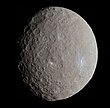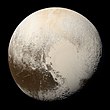Trans-Neptunian object
(84922) 2003 VS2 trans-Neptunian object discovered by the Near Earth Asteroid Tracking program on 14 November 2003.[ 1] Pluto , it is in a 2:3 orbital resonance with Neptune [ 3] [ 4] plutino . Analysis of light-curve suggests that it is not a dwarf planet .[ 11]
Orbit and rotation
Like Pluto , (84922) 2003 VS2 is locked in the 3:2 mean-motion resonance with Neptune , although its orbit is both less inclined and significantly less eccentric than Pluto's.[ 2]
(84922) 2003 VS2 has a significant light-curve amplitude of ± 0.01± 0.02 h[ 9]
Physical characteristics
(84922) 2003 VS2 has a moderately red surface with a moderately red color indices B−V=0.93, V−R=0.59.[ 12] [ 6]
In 2007, its diameter was initially estimated by the Spitzer Space Telescope at ± 200 km[ 13] +35.1 Herschel Space Telescope observations.[ 7] 2003 VS2 was found to be ellipsoidal in shape based on stellar occultations that occurred in 2013 and 2014;[ 6] [ 14] 2003 VS2 are estimated at +29.5 [ 6] 2003 VS2 has no known satellite that can be used to directly determine its mass, but assuming a density of 1 g/cm3 , typical of mid size TNO's,[ 15] × 10
2003 VS2 (apparent magnitude 19.8) as viewed with a 24" telescope Colours of the TNOs plus Phoebe , Pholus , Triton and Mars . Mars and Triton are not to scale.
See also
Sedna , another large trans-Neptunian object discovered the same day (14 November 2003)
References
^ a b Marsden, Brian G. (16 November 2003). "MPEC 2003-W02 : 2003 VS2" . IAU Minor Planet Center . Harvard-Smithsonian Center for Astrophysics. Retrieved 6 January 2010 . ^ a b c "JPL Small-Body Database Browser: 84922 (2003 VS2)" (2008-02-05 last obs). Retrieved 7 April 2016 .^ a b c Buie, Marc W. (5 February 2008). "Orbit Fit and Astrometric record for 84922" . SwRI (Space Science Department). Retrieved 23 July 2008 .^ a b "MPEC 2006-X45 : Distant Minor Planets" . Minor Planet Center & Tamkin Foundation Computer Network. 21 December 2006. Archived from the original on 28 August 2008. Retrieved 23 July 2008 .^ a b c Vara-Lubiano, M.; et al. (2022). "The multichord stellar occultation on 2019 October 22 by the trans-Neptunian object (84922) 2003 VS2 ". Astronomy & Astrophysics . 663 : A121. arXiv :2205.12878 Bibcode :2022A&A...663A.121V . doi :10.1051/0004-6361/202141842 . S2CID 249009658 . ^ a b c d e Benedetti-Rossi, Gustavo; Santos-Sanz, P.; Ortiz, J. L.; Assafin, M.; Sicardy, B.; Morales, N. (2019). "The trans-Neptunian object (84922) 2003 VS2 through stellar occultations" . The Astronomical Journal . 158 (4). arXiv :1908.06645 doi :10.3847/1538-3881/ab3b05 S2CID 201070151 . ^ a b c Mommert, Michael; Harris, A. W.; Kiss, C.; Pál, A.; Santos-Sanz, P.; Stansberry, J.; Delsanti, A.; Vilenius, E.; Müller, T. G.; Peixinho, N.; Lellouch, E.; Szalai, N.; Henry, F.; Duffard, R.; Fornasier, S.; Hartogh, P.; Mueller, M.; Ortiz, J. L.; Protopapa, S.; Rengel, M.; Thirouin, A. (May 2012). "TNOs are cool: A survey of the trans-Neptunian region—V. Physical characterization of 18 Plutinos using Herschel -PACS observations". Astronomy & Astrophysics 541 : A93. arXiv :1202.3657 Bibcode :2012A&A...541A..93M . doi :10.1051/0004-6361/201118562 . S2CID 119253817 . ^ a b Santos-Sanz, P.; Lellouch, E.; Groussin, O.; Lacerda, P.; Muller, T.G.; Ortiz, J.L.; Kiss, C.; Vilenius, E.; Stansberry, J.; Duffard, R.; Fornasier, S.; Jorda, L.; Thirouin, A. (August 2017). "2003 VS2 and 2003 AZ84 with Herschel/PACS". Astronomy & Astrophysics . 604 (A95): 19. arXiv :1705.09117 Bibcode :2017A&A...604A..95S . doi :10.1051/0004-6361/201630354 . S2CID 53621071 . ^ a b Sheppard, Scott S. (August 2007). "Light Curves of Dwarf Plutonian Planets and other Large Kuiper Belt Objects: Their Rotations, Phase Functions, and Absolute Magnitudes". The Astronomical Journal 134 (2): 787– 798. arXiv :0704.1636 Bibcode :2007AJ....134..787S . doi :10.1086/519072 . S2CID 56247384 . ^ "AstDys (84922) 2003VS2 Ephemerides" . Department of Mathematics, University of Pisa, Italy. Archived from the original on 27 March 2012. Retrieved 7 December 2009 .^ Tancredi, Gonzalo (2009). "Physical and dynamical characteristics of icy "dwarf planets" (plutoids)" . Proceedings of the International Astronomical Union Symposium S263 . 5 : 173– 185. Bibcode :2010IAUS..263..173T . doi :10.1017/S1743921310001717 (Dwarf Planet & Plutoid Headquarters) ^ Tegler, Stephen C. (1 February 2007). "Kuiper Belt Object Magnitudes and Surface Colors" . Archived from the original on 1 September 2006. Retrieved 30 December 2009 . ^ Stansberry, John; Grundy, Will; Brown, Mike; Cruikshank, Dale; Spencer, John; Trilling, David; Margot, Jean-Luc (2008). "Physical Properties of Kuiper Belt and Centaur Objects: Constraints from Spitzer Space Telescope" (PDF) . In Barucci, M. Antonietta; Boehnhardt, Hermann; Cruikshank, Dale P. (eds.). The Solar System Beyond Neptune . University of Arizona press. pp. 161– 179. arXiv :astro-ph/0702538 Bibcode :2008ssbn.book..161S . ISBN 978-0-8165-2755-7 ^ Benedetti-Rossi, Gustavo; Santos-Sanz, Pablo; Ortiz, Jose Luis; Assafin, Marcelo; Sicardy, Bruno; Vieira-Martins, Roberto; Braga-Ribas, Felipe (2019). "Three Stellar Occultations by the Plutino Object (84922) 2003 VS2". Epsc-DPS Joint Meeting 2019 . 2019 : EPSC-DPS2019-435. Bibcode :2019EPSC...13..435B . ^ Grundy, W.M.; Noll, K.S.; Buie, M.W.; Benecchi, S.D.; Ragozzine, D.; Roe, H.G. (2019). "The mutual orbit, mass, and density of transneptunian binary Gǃkúnǁ'hòmdímà (229762 2007 UK126)". Icarus . 334 : 30– 38. Bibcode :2019Icar..334...30G . doi :10.1016/j.icarus.2018.12.037 . S2CID 126574999 .
External links




